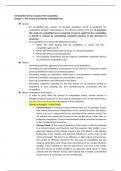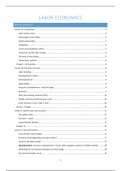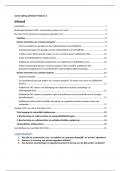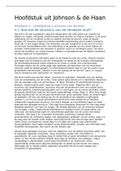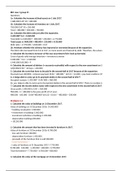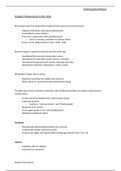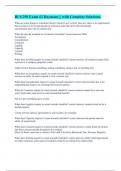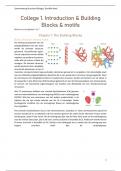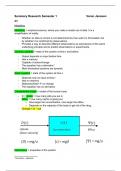Ontwikkelingspsychologie
Les 1
Introductie
Definitie ontwikkelingspsychologie
Wetenschappelijke studie
1. Stellen van vragen
2. Verklaringen opstellen
3. Onderzoek voeren -> data verzamelen
➔ Wat we vinden gebruiken om nieuwe vragen te stellen
2 types onderzoek
- Correlationeel
➔ Correlatie tussen 2 dingen
➔ Correlatie is geen causatie !
➔ Bv. als je A ziet zie je B -> de twee hebben een verband maar het een
veroorzaakt het andere niet
- Experimenteel
➔ Je neemt een groep die hard op elkaar lijkt
➔ Je splitst die groep in 2
➔ Je laat de eerste groep naar bv iets kijken en de andere naar iets
anders
➔ Elke groep Doet dan een soort opdracht
➔ Kijken of er een verschil zit tussen de 2 groepen
Je moet ook wel kijken naar andere dingen die het resultaat kunnen verklaren
Ook stilstaan bij ethiek
Van conceptie tot dood
- Verschillende levensfases
➔ Zijn niet strikt
Bv. door culturele of sociologische invloeden
➔ Verandert ook met de tijd
Bv. vroeger ging je op 18J werken terwijl je nu meer gaat ontwikkelen in
die fase
Het feit dat we langer leven zorgt er ook voor dat die laatste levensfase
uitbreidt
Je wordt ook beinvloed door je omgeving
➔ Je omgeving is veel meer dan alleen je ouders of vrienden
, Bv. het land waar je woont of de buurt maar kan ook bv. het tijdsvak zijn
waarin je leeft
Basisthema’s
- Continu of discontinu
Continu -> graduele toename van vaardigheid
Discontinu -> verschillende stadia
- Universeel of individueel
Universeel
-> kritieke/ gevoelige perioden
Bv. taal in de periode van 0 – 6/7 jaar
Iedereen neemt zelfde stappen op ong zelfde moment
Individueel
➔ Verschillende contexten
Nature/ nurture
Genetische en/of omgevingsinvloeden
Theoretisch kader
Psychoanalytische theorie
Sigmund freud
Onderbewustzijn heeft grote invloed op persoonlijkheid en gedrag
Es (id) – onbewust, geboorte/ lustprincipe
Eros -> lustdrift
Thanatos -> geen verlanges
Staat tegen over ich
Ich ( ego) – vroeg in babytijd/ realiteitsprincipe -> kanaliseert driften van es
Uber-ich (super-ego) – het geweten, ontwikkelt tussen 3 en 6j
Psychoseksuele ontwikkeling
➔ Te weinig/ veel bevredeging
➔ Fixatie
Bv. te weinig/ veel bevrediging tijdens orale fase -> roken op latere leeftijd
0-1 jaar Orale fase
, 1-3 jaar Anale fase
Bv . potty training
3-6 jaar Fallisch
- Verschil beginnen merken geslachten
- Bv. oedipus complex
6-11 jaar Latentie
- Er gebeurt niks met seksuele
ontwikkeling -> meer voor sociale
ontwikkeling
12- … Genitaal
➔ Intresse voor andere geslacht begint
belangrijk te worden
Psychosociale theorie
Erik erikson
Nadruk op sociale introductie
➔ Vertrouwen moet opgebouwd worden
Verdere ontwikkeling na adoloscentie <-> psychoanalitische
8 ontwikkelingstaken
➔ Worden nooit volledig opgelost
3- 6 -> hoe je omgeving reageert kan zorgen voor bv. schuldgevoel
6-11 -> waar situeer je je?
12-18 -> identiteit wordt fel gevormd -> wat je wil je doen in je latere leven
, 18-30 -> zoeken van een partner
60+ -> ben ik gellukig in het algemeen? Had ik andere keuzes moeten maken?
Behaviorisme
John watson
Omgeving als stimulus
Inspiratie bij pavlov’s hond
➔ Klassieke conditionering
Je biedt 2 dingen samen aan
Elke prikkel zorgt voor een gedrag maar kan gestuurd worden
Bv. little albert
Verklaart geen actief gedrag
➔ Reacties
➔ Automatisch gedrag
Operante conditionering
Gedrag aanleren door straf en beloning
Individu is nog steeds passief -> nutteloos
Stimulus -> gedrag
! gedrag dat is aangeleerd kan ook afgeleerd worden!
Sociaal- cognitieve leertheorie
Albert bandura
Puur door observatie leer je iets aan
Leren is gevolg van observatie -> ‘modeling’
➔ Niet trial en error -> kennis van mensen voor u
➔ Niet nodig om gevolgen te ervaren
Observatie -> herrineren gedrag -> acuut herhalen
Cognitieve leertheorie
Jean piaget
4 universele fases
Vaardigheden lukken soms en soms niet tot je ze volledig onder knie hebt
Schema’s als centraal concept -> obv van eerdere ervaringen
Bv. 1STE keer op restaurant gaan
Assimilatie
➔ Begrijpen van evaring obv bestaande schema’s
Les 1
Introductie
Definitie ontwikkelingspsychologie
Wetenschappelijke studie
1. Stellen van vragen
2. Verklaringen opstellen
3. Onderzoek voeren -> data verzamelen
➔ Wat we vinden gebruiken om nieuwe vragen te stellen
2 types onderzoek
- Correlationeel
➔ Correlatie tussen 2 dingen
➔ Correlatie is geen causatie !
➔ Bv. als je A ziet zie je B -> de twee hebben een verband maar het een
veroorzaakt het andere niet
- Experimenteel
➔ Je neemt een groep die hard op elkaar lijkt
➔ Je splitst die groep in 2
➔ Je laat de eerste groep naar bv iets kijken en de andere naar iets
anders
➔ Elke groep Doet dan een soort opdracht
➔ Kijken of er een verschil zit tussen de 2 groepen
Je moet ook wel kijken naar andere dingen die het resultaat kunnen verklaren
Ook stilstaan bij ethiek
Van conceptie tot dood
- Verschillende levensfases
➔ Zijn niet strikt
Bv. door culturele of sociologische invloeden
➔ Verandert ook met de tijd
Bv. vroeger ging je op 18J werken terwijl je nu meer gaat ontwikkelen in
die fase
Het feit dat we langer leven zorgt er ook voor dat die laatste levensfase
uitbreidt
Je wordt ook beinvloed door je omgeving
➔ Je omgeving is veel meer dan alleen je ouders of vrienden
, Bv. het land waar je woont of de buurt maar kan ook bv. het tijdsvak zijn
waarin je leeft
Basisthema’s
- Continu of discontinu
Continu -> graduele toename van vaardigheid
Discontinu -> verschillende stadia
- Universeel of individueel
Universeel
-> kritieke/ gevoelige perioden
Bv. taal in de periode van 0 – 6/7 jaar
Iedereen neemt zelfde stappen op ong zelfde moment
Individueel
➔ Verschillende contexten
Nature/ nurture
Genetische en/of omgevingsinvloeden
Theoretisch kader
Psychoanalytische theorie
Sigmund freud
Onderbewustzijn heeft grote invloed op persoonlijkheid en gedrag
Es (id) – onbewust, geboorte/ lustprincipe
Eros -> lustdrift
Thanatos -> geen verlanges
Staat tegen over ich
Ich ( ego) – vroeg in babytijd/ realiteitsprincipe -> kanaliseert driften van es
Uber-ich (super-ego) – het geweten, ontwikkelt tussen 3 en 6j
Psychoseksuele ontwikkeling
➔ Te weinig/ veel bevredeging
➔ Fixatie
Bv. te weinig/ veel bevrediging tijdens orale fase -> roken op latere leeftijd
0-1 jaar Orale fase
, 1-3 jaar Anale fase
Bv . potty training
3-6 jaar Fallisch
- Verschil beginnen merken geslachten
- Bv. oedipus complex
6-11 jaar Latentie
- Er gebeurt niks met seksuele
ontwikkeling -> meer voor sociale
ontwikkeling
12- … Genitaal
➔ Intresse voor andere geslacht begint
belangrijk te worden
Psychosociale theorie
Erik erikson
Nadruk op sociale introductie
➔ Vertrouwen moet opgebouwd worden
Verdere ontwikkeling na adoloscentie <-> psychoanalitische
8 ontwikkelingstaken
➔ Worden nooit volledig opgelost
3- 6 -> hoe je omgeving reageert kan zorgen voor bv. schuldgevoel
6-11 -> waar situeer je je?
12-18 -> identiteit wordt fel gevormd -> wat je wil je doen in je latere leven
, 18-30 -> zoeken van een partner
60+ -> ben ik gellukig in het algemeen? Had ik andere keuzes moeten maken?
Behaviorisme
John watson
Omgeving als stimulus
Inspiratie bij pavlov’s hond
➔ Klassieke conditionering
Je biedt 2 dingen samen aan
Elke prikkel zorgt voor een gedrag maar kan gestuurd worden
Bv. little albert
Verklaart geen actief gedrag
➔ Reacties
➔ Automatisch gedrag
Operante conditionering
Gedrag aanleren door straf en beloning
Individu is nog steeds passief -> nutteloos
Stimulus -> gedrag
! gedrag dat is aangeleerd kan ook afgeleerd worden!
Sociaal- cognitieve leertheorie
Albert bandura
Puur door observatie leer je iets aan
Leren is gevolg van observatie -> ‘modeling’
➔ Niet trial en error -> kennis van mensen voor u
➔ Niet nodig om gevolgen te ervaren
Observatie -> herrineren gedrag -> acuut herhalen
Cognitieve leertheorie
Jean piaget
4 universele fases
Vaardigheden lukken soms en soms niet tot je ze volledig onder knie hebt
Schema’s als centraal concept -> obv van eerdere ervaringen
Bv. 1STE keer op restaurant gaan
Assimilatie
➔ Begrijpen van evaring obv bestaande schema’s

